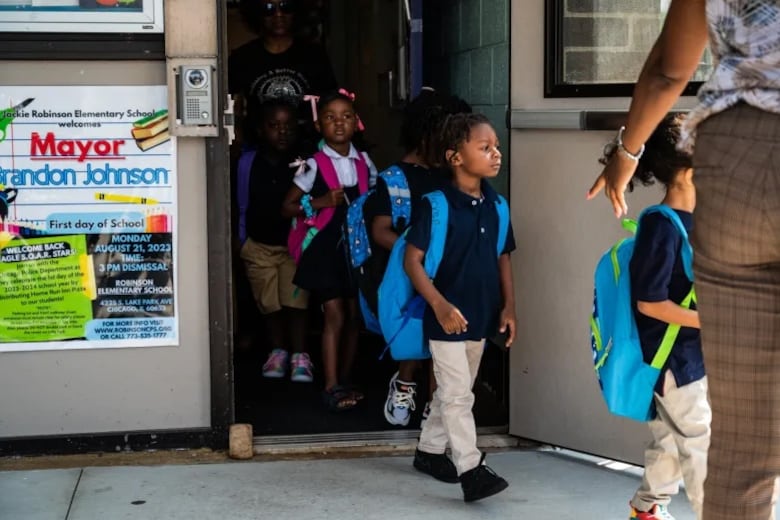Sign up for Chalkbeat Chicago’s free daily newsletter to keep up with the latest education news.
Illinois’ Kindergarten Individual Development Survey, or KIDS, can predict how students will perform on state standardized tests, such as the Illinois Assessment of Readiness, in third grade, according to a new report.
Researchers also found that white and Asian American students scored higher in KIDS than their Black and Latino peers and students who were eligible for free or reduced lunch, English learners, and students with disabilities – a gap that continued to grow larger in third grade.
High scores in kindergarten readiness for Black, Latino, and students eligible for free or reduced price lunch did not guarantee that students will meet or exceed state standards in third grade, the report found.
The Illinois Workforce and Education Research Collaborative’s report, “Inequity in the early years: Student development trajectories from Kindergarten to Grade 3,” released on Monday, found a link between KIDS scores and third grade scores on state standardized tests. It is the second of four reports looking at inequities in kindergarten readiness.
Study researchers followed two cohorts of students between kindergarten to third grade.
The first group had about 70,738 students who started kindergarten in 2017-18 — when the KIDS assessment was first rolled — and who went into third grade during the 2020-21 school year. The second group of about 97,608 students entered kindergarten in the 2018-19 school year and started third grade during the 2021-22 school year. The authors of the report looked at math and reading scores for each cohort.
Illinois requires students to start school at the age of 6, when some students would start first grade. This study does not include that group of students, since researchers only followed students to whom they could link KIDS and IAR scores.
In their first report, researchers found that white and Asian American students scored between 15 to 25 percentage points higher than Black and Latino students in social-emotional learning, language and literacy, and math between school years 2017-18 and 2021-22 on KIDS. Black students saw the biggest declines in scores between 2019-20 and 2021-22, at the height of the coronavirus pandemic when schools were remote.
Students who were eligible for free or reduced price lunch, English learners, and students with Individualized Education Programs were less likely to be ready for kindergarten.
The report also found that teachers were not using an alternative language and literacy assessment for the majority of English learners. The Illinois State Board of Education “strongly recommends” that teachers use the alternate assessment in bilingual classrooms, which make up 20% of the English learners. For English learners not in bilingual classrooms but are in general education classrooms or English as a second Language Classrooms, which make up 80% of English learners, the state board’s guidance allows teachers to decide if they should use the alternative assessment.
While the second report in the series linked kindergarten readiness to third grade academic success, the authors caution against making conclusions for four reasons: KIDS is a new survey for schools, KIDS and the IAR are different assessments not designed to be compared, scores for these assessments would have been impacted by the coronavirus pandemic, and assessments are not perfect measures of students’ learning and development.
Unlike the Illinois Assessment of Readiness for students from third through eighth grades, KIDS is considered an “observational tool” by the Illinois State Board of Education.
Kindergarten teachers are required to observe students in the first 40 days of school to determine where students are on social emotional development, literacy and language development, and math skills and if they are ready for K-12 schools.
Meg Bates, director of the Illinois Workforce and Education Research Collaborative and one of the report’s authors, said the research collaborative has a statewide research advisory council that was interested in KIDS since it is relatively new and had changed over time – originally designed with 55 measures, then streamlined to 14.
“People hadn’t really looked at it that hard in terms of its technical properties and if it was predictive of anything.,” said Bates. “I think a lot of people had concerns like ‘it was designed one way and it’s being used another way. What is it doing for us and is it a useful tool?”
When looking at disparities in KIDS scores and between kindergarten and third grade, Bates said that “the story is about systemic inequities, resources and opportunities.”
According to Bates, some children do not have access to pre-kindergarten, day care, health care, nutrition, and community resources. As students get older, there is a need to look at the access to schools that different students have plus the funding and resources those schools have.
For Sebastian Kiguel, one of the authors of the report and a research associate at the research collaborative, the big takeaway from the report should be, “Where you are in kindergarten is not destiny, but it does say a lot about where you might end up In third grade.”
Students who are kindergarten-ready are three times more likely to be proficient in math and reading, Kiguel said. However, some students scored low on KIDS and went on to be proficient.
The next two reports in the IWERC’s kindergarten readiness series will look at the impact of early childhood education programs like preschool and home visiting programs and K-12 schools and district resources.
Samantha Smylie is the state education reporter for Chalkbeat Chicago covering school districts across the state, legislation, special education and the state board of education. Contact Samantha at ssmylie@chalkbeat.org.





